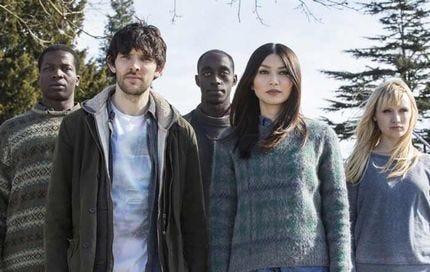Staying Human In a World of Platforms, Screens and Masks
#WF22 Six Ways Technology Makes Us More Human Not Less
👋 This is the 22nd regular update from the Workforce Futurist Newsletter – which is read by those on a journey to make work better.
📬 You can get future issues delivered to your inbox, just enter your email here:
“Hey Andy - loved the Metaverse article, but all the talk of platforms and the liquid workforce scares the hell out of me...”
Sammo, 36, Rustacean*, weekend footballer and human being.
I’ve written recently about the changing role of technology in society and work.
The Human Stock Market.
Web3 Work Matching Markets.
60 Year Careers.
The Metaverse.
For some this can paint a rather cold and dystopian future, for others it can seem liberating. For some there is no safety net, for others, the status quo isn’t working.
We need to build a preferable future that benefits as many humans as possible.
The world may well be changing faster than ever, but we human beings aren't. Evolution hasn’t accelerated in the last 10 years, and I’m pretty sure we are similar to the humans who walked the earth 1,000 years ago.
It's not so much staying alive, it's staying human that's important. What counts is that we don't betray each other.
George Orwell, 1984.
I want to warm things up a little today - here are 6 ways technology help us to be more human, not less.
We will learn more about us humans in the next 10 years than in the past 100 years
There have been some amazing engineering breakthroughs in Artificial Intelligence since I learned how to programme neural networks and could recall a Theory of Mind. The focus has been on creating more effective algorithms and apps to process data, images and language. This will have created a treasure trove of data on how we actually behave. Insights from this data should be regarded as a public good and not owned by companies or locked up inside academia. I am hopeful we will learn so much in the coming years.
Better human connections from the matching machines
How on earth did people find anything outside their house before the internet?
We now have a better chance of finding purple shoe laces, a compatible date, a decent plumber, or a graphic designer.
The matching is not perfect but still better than asking your mum.
Some people will feel more comfortable in virtual worlds
The metaverse might not sound as appealing as dancing cheek-to-cheek💃🏽, but the outside world can appear hostile to many. Facebook’s huge success in recent years was because they fulfilled a human need – they allowed people to socialise and reduce loneliness. It is no surprise that people want to create their own safer worlds and seek solace behind different identities, and masks.
The Great Flourishing – people are quitting their jobs for positive reasons
To understand the term, ‘the great resignation’ it’s worth getting different perspectives.
Lift yourself up 3 years and you will see pent-up attrition.
Lift yourself up 10 years and you will see people seeking more autonomy, equity and flexibility. The pandemic has given many people time to reflect and we are seeing ‘The Great Flourishing’. People are voting with their feet, earning a living in diverse ways which is not always in formal employment.
Lift yourself up 30 years and you will see the impact of 600m Chinese joining the global workforce since the 1980s to reduce wages in the west. This will peak, and demand for workers will increase pushing wages in certain sectors.
Jobs may unbundle, employment may fall, but we will always work
There has been much talk of the workless world as human labour is replaced by clever machines. Work is a defining human characteristic. Employment patterns may change, but this should not be confused with work.
Work won’t go away – whether that’s gardening, coaching, caring, fixing, running.
New technology will give us more options to incentivise, allocate tasks and make payments. The continuing challenge will be to connect with your personal passions to make work feel worthwhile and meaningful.
Designing an experience fit for workers
I have been involved in earnest endeavours to design and build organisations. Linking the business strategy to how work, information, and power flows through an organisation. Workshops were run confidently, backed by a sparkling rationale based on higher-order evidence and a nod from the big boss. When it came to mapping out the employee experience (borrowed from marketing 20 years ago), we ended up with a soul-sapping intranet screen and 50 clicks. Today, we end up in a spaghetti diagram of 20 different apps and systems. There is hope, I can see new teams emerging from the rubble using a better set of tools and a different mindset. More geared up to how the team actually works rather than the rigid constraints of enterprise procurement and SaaS monthly pricing.
It’s not what technology does to us - but what we do with technology that counts.
In memory of Gareth Jones.
Talking Humans 🗣️
My talk in Lisbon recently on Blockchain, the Decentralised Workforce and what it means for the Future of Work, is now available.
Looking forward to speaking at a CIPD London event on Thursday 18th November, Where Does HR Stand on the Future of Work? With Professor Juani Swart, Dr Wilson Wong, Enrique Rubio and Ciprian Arhire.
I will speaking about “How We Can Use Technology to Build a Better People Profession” at the HPMA Conference on 2nd December.
I am included in a panel discussion with BrightTALK on Nov 16th - How AI Is Powering the Move to a Hybrid Workforce
*Rust Programmer




